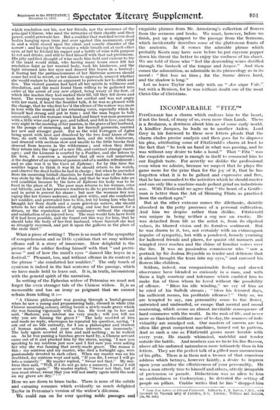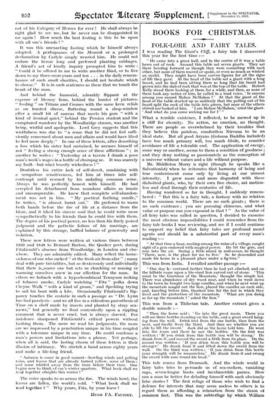INCOMPARABLE "FI'Z'Z."*
FrrzGtaassi has a charm which endears him to the heart., if not the head, of many of' us, even more than Lamb. There is a freshness, a dewiness about him as of some early world. A kindlier Jacques, he leads us to another Arden. Lord Grey in his foreword to these new letters pleads that the charm eludes precise analysis and then goes far to disprove his plea, attributing some of FitzGerald's charm at least to the fact that " he took no hand in what was passing, and he was without any desire to take a hand." That " Fitz " was the exquisite amateur is enough in itself to commend him to our English taste. For secretly we dislike the professional even when we admire, because we suspect that he plays the game more for the prize than for the joy of it, that he has forgotten what it is to be gallant and expressive and free, that he has succumbed to the activities which he should master and can only like a machine-made pedant grind an industrious axe. With FitzGerald we agree that " the heart of a Gentle- man is better than the Art of Skinning Flints as practised from the earliest ages."
But at the other extreme comes the dilettante, daintily absorbed in the petty processes of a personal cultivation. And him we despise rather than dislike. FitzGerald was unique in being neither a cog nor an exotic. Ile was detached from life as the artist is, from its slipshod values, its blurred vision and its formless sentiment. But he was drawn to it, too, not certainly with an extravagant impulse of sympathy, but with a pondered, homely yearning for hallowed friends and places, for quaint old manners and wimpled river reaches and the chime of familiar voices over the fire. It was no passionless connoisseur who " saw a portrait by Sir Joshua Reynolds so tender and delicious that it almost brought the tears into my eyes," and caressed his flowers like children.
Seldom, indeed, can companionable feeling and shrewd observance have blended so curiously in a man, and with them a high courtesy and tolerance which enabled him to make fun of those whom lie loved without the possibility of offence. " Bless his idle winding," we cry of him as he cried of his Suffolk stream ; " bless his leisured days, his sufficient means, his profitable idleness ! " Only so, we are tempted to say, can personality come to fine flower, untwisted and undwarfed, or escape that mental and moral coarsening, which seems an almost inevitable consequence of hard commerce with the world. In the rush of life, and never more so than inthe militant race of to-day, the nuances of indi- viduality are smudged out. Our masters of success arc too often like great competent machines, turned out to pattern. And so such a one as FitzGerald grows more lovable with every year. He stands whimsical, watchful and tender outside the battle. And nowhere can we taste his fine flavour, above all his unforced naturalness more intimately than in his letters. They are the perfect talk of a gifted man unconscious of his gifts. There is in them not a tremor of that conscious address which betrays, however faintly, a desire to impress upon your auditor the effectiveness of your personality. He was a man utterly true to himself and others, utterly incapable of pretension or parade. Didacticism was as alien to him as snobbishness or Cockneyism ; he detested the setting of people on pillars. Crabbe writes that lie has " dropped him • Some New Letters of Edward FitzGerald. Edited by F. R. Barton, C.31.0.. with foreword by iriscoaat (trey of lallodon, K,(1, Lomiou; Williams said NorgaU), ii3a,'6d. ink)
out of his Category of heroes for ever ! He shall always be right glad to see me, but he never can be disappointed in me again ! How much the best footing is this to be upon with all one's friends ! "
It was this unexacting footing which he himself always adopted. A perforpance of the Messiah or a prolonged
declamation by Carlyle simply wearied him. He could not endure the heroic long and preferred planting cabbages.
A friend's act of kindly inquiry prompted him to write : " Could it be offered to me to write another Iliad, or to live down to my three-score years and ten . . . in the daily remem- brance of such small charities, I should not hesitate which to choose." . It is in such sentences as these that we touch the heart of the man.
And behind the humorist, adorably flippant at the expense of literary lions, behind the hunter of pictures, " feeding " on Titians and Cromes with the same keen relish as on toasted cheese, fluttering round a shop-window after a small bit of canvas that meets his gaze " with a kind of ironical quiet," behind the Persian student and the enraptured wanderer by the Woodbridge stream, was another being, wistful and apologetic. Lord Grey suggests that this wistfulness was due to " a sense that he did not feel suffi- ciently concerned about men and affairs and would have liked to feel more deeply." In one of these letters, after describing a loss which his sister had sustained, he accuses himself of not " feeling a strong enough sense of these afflictions " ; in another he writes : " Yesterday at a tavern I drank a poor man's week's wages in a bottle of champag nc. It was scarcely my fault—but what beastly wickedness ! "
Doubtless his entire lack of self-deceit, combining with a scrupulous sensitiveness, led him at times into self- contempt until rescued by his unfailing common sense. Always he was perfectly honest with himself. He had accepted his detachment from mundane affairs as innate and unconquerable. He knew that complete self-abandon- ment was not in him. " My poetical farthing candle," be writes, " is almost burnt .out." He preferred to warm both hands before the fire of life at a distance from the blaze, and it irked his sincere soul that he could write more sympathetically to his friends than he could live with them.
The degree of his poetical power, no less than his finely poised judgment and the pathetic failure of his marriage, are explained by this strange, baffled balance of generosity and isolation.
These new letters were written at various times between 1839 and 1848 to Bernard Barton, the Quaker poet, during FitzGerald's absence from Woodbridge, in London and else- where. They are admirably edited. Many reflect the home- sickness of one who sucked " at the fresh air from afar " ; many deal with pure trivialities, but so dexterously and individually that there is-scarce one but sets us chuckling or musing or warming ourselves anew in our affection for the man. In others we hobnob with a hypochondriacal Tennyson reeking of tobacco smoke, Carly-le watching " Fitz " polka down Cheyne Walk " with a kind of groan," and Spedding trying to sail his boat with a kite. Occasionally FitzGerald's flip- pancy touches the ecstatic in such a passage as " Dr. Lynn has had paralysis—and we all live in a ridiculous parenthesis of Time on a shelf made by insects and planted by stray sea- mews," but generally we float contentedly upon a rippling comment that is never cruel, but is always shrewd. For indolence sharpened FitzGerald's critical powers without barbing them. The more we read his judgments, the more are we impressed by a penetration unique in his time coupled with a tolerance unique in any time. He could condense a man's powers and limitations into a phrase. Yet perhaps, when all is said, the lasting charm of these letters is their illusion of intimacy. We stretch a hand across eighty years and make a life-long friend.
" Autumn is come in good earnest—howling winds and pelting mins, and leaves that are already turned yellow, some of them : and sonic whirled away from the trees before their tune. One Leging now to think of one's winter quarters. What book shall we read together ofnights this winter ?'
The voice speaks to us across the fire. The winds howl, the
leaves are fallen, the world's cold. " What book shall we read together ? " Why yours, Fitz, by your leave ! -
HUGH I'A. FAUSSET.



















































 Previous page
Previous page